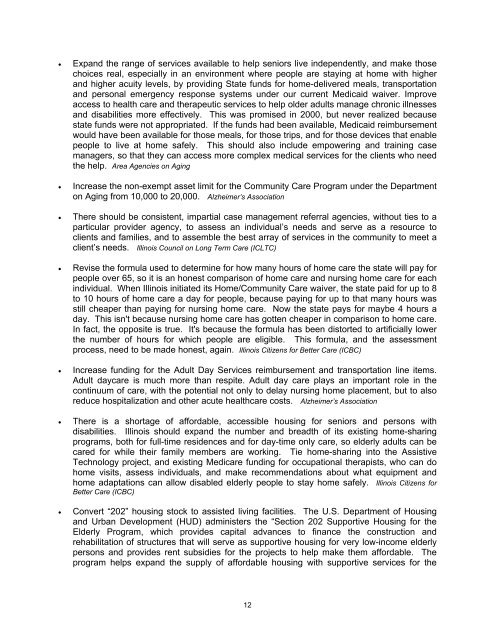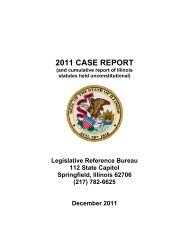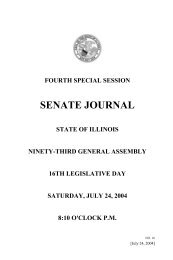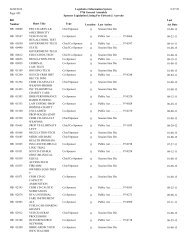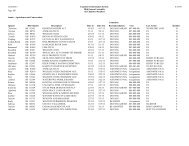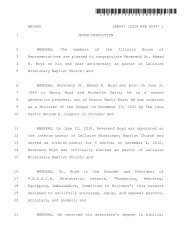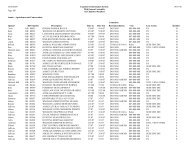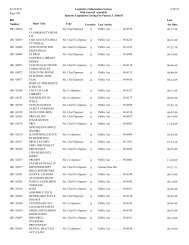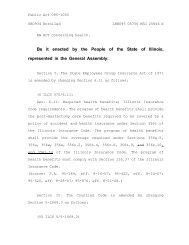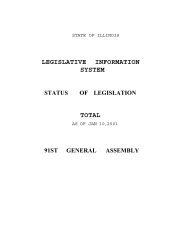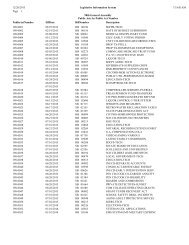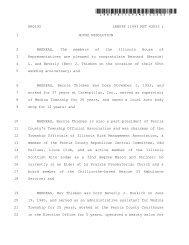Long-Term Care - Illinois General Assembly
Long-Term Care - Illinois General Assembly
Long-Term Care - Illinois General Assembly
You also want an ePaper? Increase the reach of your titles
YUMPU automatically turns print PDFs into web optimized ePapers that Google loves.
• Expand the range of services available to help seniors live independently, and make those<br />
choices real, especially in an environment where people are staying at home with higher<br />
and higher acuity levels, by providing State funds for home-delivered meals, transportation<br />
and personal emergency response systems under our current Medicaid waiver. Improve<br />
access to health care and therapeutic services to help older adults manage chronic illnesses<br />
and disabilities more effectively. This was promised in 2000, but never realized because<br />
state funds were not appropriated. If the funds had been available, Medicaid reimbursement<br />
would have been available for those meals, for those trips, and for those devices that enable<br />
people to live at home safely. This should also include empowering and training case<br />
managers, so that they can access more complex medical services for the clients who need<br />
the help. Area Agencies on Aging<br />
• Increase the non-exempt asset limit for the Community <strong>Care</strong> Program under the Department<br />
on Aging from 10,000 to 20,000. Alzheimer’s Association<br />
• There should be consistent, impartial case management referral agencies, without ties to a<br />
particular provider agency, to assess an individual’s needs and serve as a resource to<br />
clients and families, and to assemble the best array of services in the community to meet a<br />
client’s needs. <strong>Illinois</strong> Council on <strong>Long</strong> <strong>Term</strong> <strong>Care</strong> (ICLTC)<br />
• Revise the formula used to determine for how many hours of home care the state will pay for<br />
people over 65, so it is an honest comparison of home care and nursing home care for each<br />
individual. When <strong>Illinois</strong> initiated its Home/Community <strong>Care</strong> waiver, the state paid for up to 8<br />
to 10 hours of home care a day for people, because paying for up to that many hours was<br />
still cheaper than paying for nursing home care. Now the state pays for maybe 4 hours a<br />
day. This isn't because nursing home care has gotten cheaper in comparison to home care.<br />
In fact, the opposite is true. It's because the formula has been distorted to artificially lower<br />
the number of hours for which people are eligible. This formula, and the assessment<br />
process, need to be made honest, again. <strong>Illinois</strong> Citizens for Better <strong>Care</strong> (ICBC)<br />
• Increase funding for the Adult Day Services reimbursement and transportation line items.<br />
Adult daycare is much more than respite. Adult day care plays an important role in the<br />
continuum of care, with the potential not only to delay nursing home placement, but to also<br />
reduce hospitalization and other acute healthcare costs. Alzheimer’s Association<br />
• There is a shortage of affordable, accessible housing for seniors and persons with<br />
disabilities. <strong>Illinois</strong> should expand the number and breadth of its existing home-sharing<br />
programs, both for full-time residences and for day-time only care, so elderly adults can be<br />
cared for while their family members are working. Tie home-sharing into the Assistive<br />
Technology project, and existing Medicare funding for occupational therapists, who can do<br />
home visits, assess individuals, and make recommendations about what equipment and<br />
home adaptations can allow disabled elderly people to stay home safely. <strong>Illinois</strong> Citizens for<br />
Better <strong>Care</strong> (ICBC)<br />
• Convert “202” housing stock to assisted living facilities. The U.S. Department of Housing<br />
and Urban Development (HUD) administers the “Section 202 Supportive Housing for the<br />
Elderly Program, which provides capital advances to finance the construction and<br />
rehabilitation of structures that will serve as supportive housing for very low-income elderly<br />
persons and provides rent subsidies for the projects to help make them affordable. The<br />
program helps expand the supply of affordable housing with supportive services for the<br />
12


